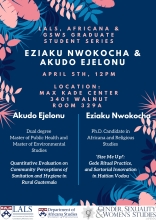Eziaku Nwokocha
Bio: Eziaku Nwokocha has already earned a master’s at Harvard Divinity School. As a graduate student in Africana and Religious studies at the University of Pennsylvania, she undertakes ethnographic research on gender sexuality, fashion and material culture in Haitian Vodou, focusing on women in Jacmel, Haiti and the diasporic communities in Montreal and Boston.
Title: 'Size Me Up!': Gede, Ritual Practice, and Sartorial Innovation in Haitian Vodou
Abstract: In this ethnographic paper, I explore how clothing can be used to create a reciprocal exchange between spirits and practitioners of African Diasporic Religions, in particular Haitian Vodou. I argue that the dress itself is not only a material object but, like other ritual objects, is a mode of an intrinsic dialogue within the spiritual world. Building on Aisha Beliso De-Jesus re-introduction to co-presence which describes are “active spiritual and religious subjectivities intimately tied to practitioners’ forms of movement, travel, and sensual bodily registers, I consider how clothing constructs ritual and spiritual transmission within the everyday lives of practitioners. Thus, I argue that clothing, like co-presences, are still drawing from the socio-cultural and political realms of its people as it concurrently contends various ideologies of gender, race and class. This type of construction produces a particular kind of worshipper that is permissible by the spirit, materializing (enacting, embodying) a socio-spiritual figure of the past that informs the present. In short, there is a collective imagining with clothing, spirits ask for colors and materials that they fashion for themselves and the space for them to come down to. Clothing, like the body, become a material canvas for spirits and practitioners to fashion and communicate with the each other.
Akudo Ejelonu
Bio: Akudo Ejelonu is dual degree Master of Public Health and Master of Environmental Studies graduate student. She is committed to working in global health research focused on WASH (water, sanitation, and hygiene), gender politics, immigration and environmentally induced migration. Some of her diverse interests are population studies, ethnography, program evaluation, infectious disease, and mixed methods study. She is foodie, yogi, traveler and dedicated to learning different languages. Currently, she is an elected student board member at the Global Water Alliance, a Philadelphia based organization that is committed to increasing global access to safe drinking water, sanitation and hygiene in the city and beyond.
Title: Quantitative Evaluation on Community Perceptions of Sanitation and Hygiene in Rural Guatemala
Abstract: The high prevalence of diarrheal diseases in the village of Tzununá, Guatemala is linked to a lack of sanitation facilities and handwashing practices. The Engineers Without Border University of Pennsylvania Chapter and local partners designed an intervention to reduce diarrheal disease and elimination of open defecation by building pour flush latrines in 50 households. They also provided education on the importance of handwashing practice. Through convenience sampling, we surveyed 45 households to evaluate the community’s knowledge of diarrheal disease, handwashing practices, and maintenance of the latrines. The respondents did not report reduction of diarrheal disease as a reason for latrine use and maintenance. Instead, they associated their motivation with aesthetics, ease and comfort, and reduction of social stigma. We found that social interaction and social pressure drove the household use of latrines. We recommend that the education program facilitate conversations and activities about the influence of social norms and behavior in sanitation and hygiene practices.

 The Program in Gender, Sexuality, and Women’s Studies
The Program in Gender, Sexuality, and Women’s Studies